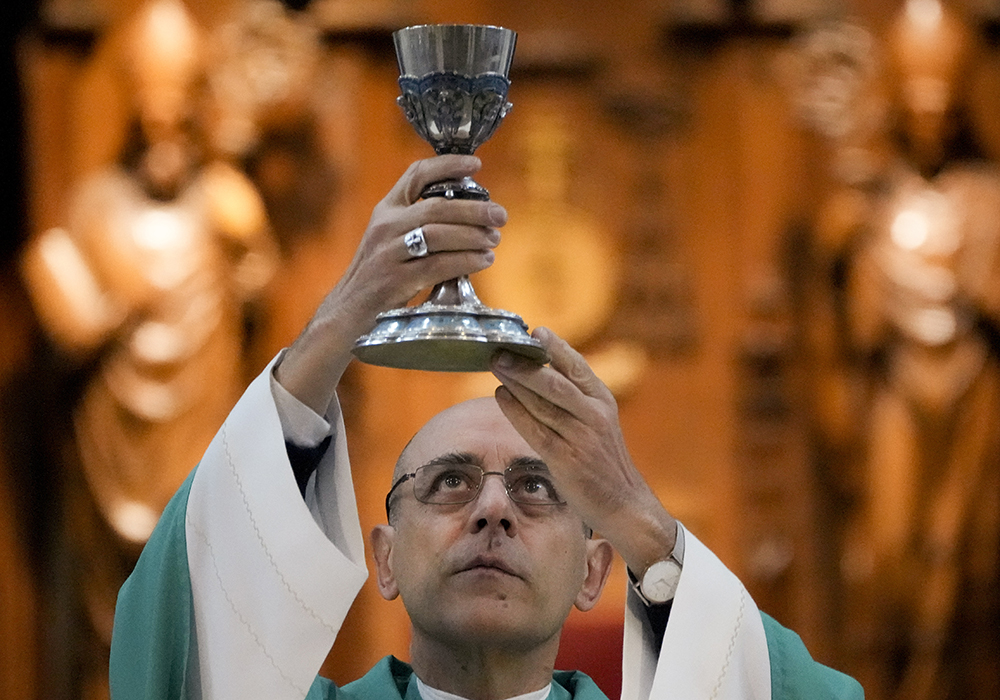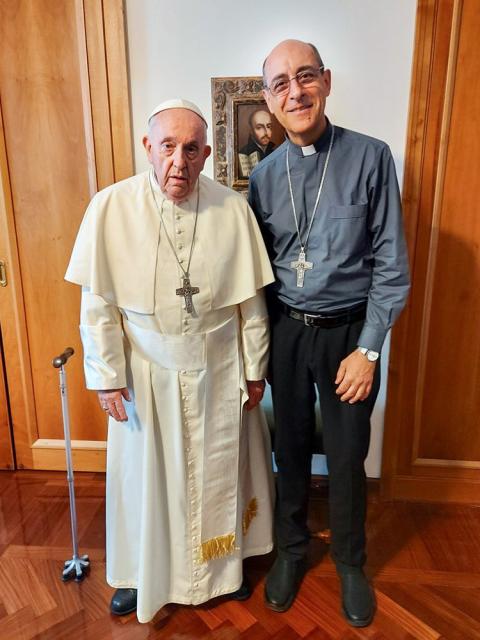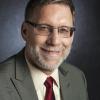
Monsignor Víctor Manuel Fernández, archbishop of La Plata, officiates a Mass at the Cathedral July 9 in La Plata, Argentina. Fernandez was appointed by Pope Francis to head the Holy See's Dicastery for the Doctrine of the Faith at the Vatican. (AP photo/Natacha Pisarenko)
Pope Francis' naming of his long-time Argentine collaborator, Archbishop Víctor Manuel Fernández, as the new prefect of the Vatican's Dicastery for the Doctrine of the Faith marks the most consequential curial appointment of this 10-year-old pontificate. The appointment is noteworthy both for who was appointed and for the pope's bold articulation of a new mandate for the notorious dicastery.
Many supporters of Francis have been disappointed over the years by his reluctance to appoint figures to curial leadership more in keeping with his vision for the church. Often, he seemed too willing to allow outspoken curial critics of his papal ministry (e.g., Cardinal Gerhard Müller and Cardinal Robert Sarah) to remain in office. But now, the pope has appointed an enthusiastic supporter of his reformist program to lead one of the most powerful curial offices.
Not surprisingly, those sympathetic to Francis' papal agenda have hailed the appointment of Fernández, who worked closely with then-Cardinal Jorge Bergoglio in the drafting of the 2007 Aparecida document. Fernández also contributed substantially to the drafting of three of the most significant documents of this pontificate, the 2013 apostolic exhortation Evangelii Gaudium, often called the "Magna Carta" of Francis' pontificate; the 2015 encyclical "Laudato Si', on Care for Our Common Home," the pope's groundbreaking encyclical on ecological concerns and climate change; and the 2016 apostolic exhortation Amoris Laetitia, the controversial text on marriage and family.
Although most voices on the Catholic left have praised the appointment, some advocates for victims of clerical sexual abuse have been quite critical. Anne Barrett Doyle, a co-director of BishopAccountability.org, has complained about Fernández's possible mishandling of a prominent clerical sexual abuse case in his archdiocese. Fernández has himself admitted that his treatment of the case was "insufficient." He claims he initially refused the Vatican appointment because the doctrinal dicastery also oversees clerical sexual abuse cases, and he felt insufficiently trained to oversee such important work.
Most protests, however, have come from the Catholic right. Articles authored by Dan Hitchens, a senior editor of First Things, and Luisella Scrosatti, have criticized Fernández for what the authors claim are serious doctrinal ambiguities. Others have lampooned a booklet Fernández wrote on kissing in an effort to reach out to Catholic youth during his days as a young parish priest.
Soon after the appointment was announced, the National Catholic Register also reported that Fernández had himself been the subject of a doctrinal investigation by the very dicastery he will now lead. The investigation concerned the conferral of the nihil obstat necessary for Fernández to be named rector of the Pontifical Catholic University of Argentina in 2009. The case would eventually be resolved and the nihil obstat granted, about two years later.
It would be impossible to treat adequately in any detail the wide range of criticisms that have been leveled against Fernández. Some of the accusations regarding doctrinal matters fail to acknowledge a legitimate gradation in the authority of church teaching. These critics evince precisely the kind of dogmatism that Francis has often challenged. I suspect that part of the critical reception of the appointment is due to a kind of Eurocentric bias against the more pastoral style of theology evident in much of Fernández's work and common in Latin America. After all, the last four prefects of this dicastery were theologians trained at major European universities.

Cardinal-designate Víctor Manuel Fernández, appointed prefect of the Dicastery for the Doctrine of the Faith by Pope Francis July 1, is pictured with Pope Francis June 30 at the Vatican. Francis will elevate Fernández to the College of Cardinals during a special consistory at the Vatican Sept. 30. (CNS/Archbishop Víctor Manuel Fernández Twitter page)
Of greater significance is what the appointment says about the current moment in the Francis pontificate. Francis is almost 87 years old, and it is hard to imagine this tireless pope continuing at his current pace for too many more years. It increasingly appears as if the upcoming fall 2023 and 2024 assemblies of the synod on synodality in Rome will provide the denouement of this pontificate, the capstone of a papacy committed to bringing to fruition the still unrealized vision of the Second Vatican Council.
Over the last several years, we have seen Francis doubling down on the kind of institutional changes necessary to unleash the full power of synodality. Almost a year and a half ago, the pope promulgated his long-awaited constitution on the reform of the Curia, Praedicate Evangelium, finally opening top curial positions to lay men and women. After years of largely token nods toward the greater inclusion of women in church decision-making, the pope has dramatically expanded the role of women as voting members of the upcoming synodal assemblies. And now, he has appointed as head of the most powerful office in the Curia a man ideally suited to support the work of synodality.
Lest there be any doubt regarding the significance of this appointment, the announcement was accompanied by a public letter to Fernández that put forward a dramatically new articulation of the mandate for the Vatican's doctrinal office.
It has been centuries since the one time "Holy Roman Inquisition" engaged in its infamous draconian measures to preserve the integrity of Catholic doctrine. Yet, in the decades prior to the council, the great ressourcement theologian Dominican Fr. Yves Congar could still compare the "Holy Office" to his experience with the Gestapo as a prisoner of war. Even in the decades after the council, the then-Congregation for the Doctrine of the Faith was widely criticized for its failure to honor the council's teaching on the hierarchy of truths and for its failure to provide theologians being investigated for possible doctrinal errors with appropriate due process.
In his public letter, Francis acknowledges the often "immoral methods" employed by the dicastery in times past. To be sure, the Dicastery for the Doctrine of the Faith (renamed in Praedicate Evangelium) must remain committed to upholding "the perennial teaching of the Church," although, the pope adds, this must also include more recent magisterial teaching.
Advertisement
Francis believes the encouragement of a responsible pluralism of theology, philosophy and pastoral practice, when open to the reconciling work of the Spirit, is far more effective in preserving church doctrine than "any control mechanism." In Francis' view, the frequent recourse to punitive measures may have done more harm than good. This is entirely in keeping with Francis' consistent emphasis on the fundamental pastorality of doctrine. Francis believes that doctrine must always serve the basic Christian kerygma, "what is most beautiful, most grand, most appealing and at the same time most necessary," as he wrote in Evangelii Gaudium.
The pope reorients the mission of the dicastery around key conciliar teachings on the primacy of dialogue, dynamic development of tradition, and hierarchy of truths. The office should steer theologians away from a "desk-bound theology," encouraging instead theological knowledge put in dialogue with the life of the church and with the concerns of the modern world (Gaudium et Spes, Paragraphs 21, 23, 43, 92). Theology must engage "questions posed by the progress of the sciences and the development of society."
The pope reminds Fernández that theology should help the church grow in its understanding of divine revelation (Dei Verbum, 8). With a nod to the council's teaching on the hierarchy of truths (Unitatis Redintegratio, 11), the pope insists the dicastery should also remain mindful of "a harmonious order among the truths of our message."
With this bold curial appointment, the pope has elevated a key collaborator to a position of extraordinary influence while further institutionalizing his commitment to synodality, the pastorality of doctrine, and the teaching of the Second Vatican Council. And with the announcement of 21 new cardinals, including Fernández, Francis' recent actions increase the possibility that his reformist program may continue after the next papal conclave, whenever that may be.







